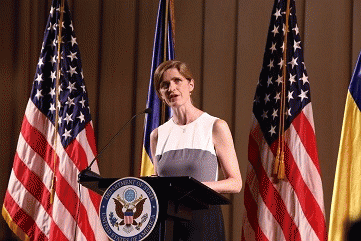Reprinted from Foreign Policy In Focus
Is the United States on the verge of enshrining humanitarian intervention as a bedrock principle of foreign policy?
While the mainstream media focuses on losers and winners in the race between Hillary Clinton and Donald Trump, a largely unreported debate is going on over the future course of U.S. diplomacy. Its outcome will have a profound effect on how Washington projects power -- both diplomatic and military -- in the coming decade.
The issues at stake are hardly abstract. The United States is currently engaged in active wars in Afghanistan, Iraq, Syria, Yemen, and Somalia. It has deployed troops on the Russian border, played push-and-shove with China in Asia, and greatly extended its military footprint on the African continent. It would not be an exaggeration to say -- as former U.S. Secretary of Defense William Perry has recently done -- that the world is a more dangerous place today than it was during darkest times of the Cold War.
Tracking the outlines of this argument is not easy, in part because the participants are not always forthcoming about what they are proposing, in part because the media oversimplifies the issues. In its broadest framework, "realists" represented by former National Security Adviser Henry Kissinger, Harvard's Steven Walt, and University of Chicago's John Mearsheimer have squared off against "humanitarian interventionists" like current UN Ambassador Samantha Power. Given that Power is a key adviser to the Obama administration on foreign policy and is likely to play a similar role if Clinton is elected, her views carry weight.
In a recent essay in the New York Review of Books, Power asks, "How is a statesman to advance his nation's interests?" She begins by hijacking the realist position that U.S. diplomacy must reflect "national interests," arguing that they are indistinguishable from "moral values." What happens to people in other countries, she argues, is in our "national security."
Power -- along with Clinton and former President Bill Clinton -- has long been an advocate for "humanitarian intervention," behind which the United States intervened in the Yugoslav civil war. Humanitarian intervention has since been formalized into "Responsibility to Protect," or R2P, and was the rationale for overthrowing Muammar Gaddafi in Libya. Hillary Clinton has argued forcibly for applying R2P to Syria by setting up "no-fly zones" to block Syrian and Russian planes from bombing insurgents and the civilians under their control.
But Power is proposing something different than humanitarian intervention. She is suggesting that the United States elevate R2P to the level of national security, which sounds uncomfortably like an argument for U.S. intervention in any place that doesn't emulate the American system.
Facing Off against the Kremlin
Most telling is her choice of examples: Russia, China, and Venezuela, all currently in Washington's crosshairs. Of these, she spends the most time on Moscow and the current crisis in Ukraine, where she accuses the Russians of weakening a "core independent norm" by supporting insurgents in Ukraine's east, "lopping off part of a neighboring country" by seizing Crimea, and suppressing the news of Russian intervention from its own people. Were the Russian media to report on the situation in Ukraine, she writes, "many Russians might well oppose" the conflict.
Power presents no evidence for this statement because none exists. Regardless of what one thinks of Moscow's role in Ukraine, the vast majority of Russians are not only aware of it, but overwhelmingly support President Vladimir Putin on the issue. From the average Russian's point of view, NATO has been steadily marching eastwards since the end of the Yugoslav war. It is Americans who are deployed in the Baltic and Poland, not Russians gathering on the borders of Canada and Mexico. Russians are a tad sensitive about their borders, given the tens of millions they lost in World War II, something of which Power seems oblivious.
What Power seems incapable of doing is seeing how countries like China and Russia view the United States. That point of view is an essential skill in international diplomacy, because it is how one determines whether or not an opponent poses a serious threat to one's national security.
Is Russia -- as President Obama recently told the UN -- really "attempting to recover lost glory through force," or is Moscow reacting to what it perceives as a threat to its own national security? Russia did not intervene in Ukraine until the United States and its NATO allies supported the coup against the President Viktor Yanukovych government and ditched an agreement that had been hammered out among the European Union, Moscow, and the United States to peacefully resolve the crisis.
Power argues that there was no coup, but U.S. Assistant Secretary of State Victoria Nuland and the U.S. Ambassador to the Ukraine, Geoffrey Pyatt were caught on tape talking about how to "mid-wife" the takeover and choose the person they wanted to put in place.
As for "lopping off" Crimea, Power had no problem with the United States and NATO "lopping off" Kosovo from Serbia in the Yugoslav War. In both cases local populations -- in Crimea by 96 percent -- supported the takeovers.
(Note: You can view every article as one long page if you sign up as an Advocate Member, or higher).






